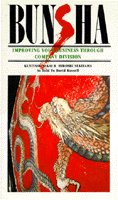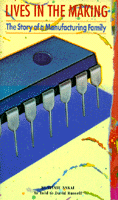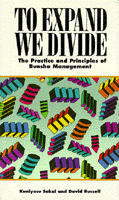Intercultural Group
New York & Tokyo
There is no economic relationship on earth more important than the one between
the United States and Japan. In spite of this, Americans tend not to know much
about the realities of Japanese business beyond the superficial reports on TV
and in the newspaper. In these three books, Kuniyasu Sakai reveals one of
Japan's best kept secrets, the true engine of innovation that has made it one of
the most dynamic economies of the last forty years. These books, published in
the United States by the Intercultural Group, are the most exciting on business
management I have ever read.
Ken McCarthy
E-Media

BUNSHA: Improving Your Business Through Company Division
Bigger is NOT better!
Kuniyasu Sakai and his partner, Hiroshi Sekiyama, are legendary managers in
Japan. In the process of creating a prosperous group of companies, they
discovered how to keep their companies on the cutting edge, their employees
productive, and their clients happy, all at the same time. Their method is what
Mr. Sakai calls bunsha (literally, 'dividing companies'), a system he
and Mr. Sekiyama developed over more than 40 years of real-world corporate
management.
Neither an academic theory, nor some uniquely-Japanese management concept, (Mr.
Sakai urges managers to forget about studying theories and get back to doing
what they do best: managing their companies), Bunsha's message is not
merely one of improving corporate profit through downsizing, it is also a
format for improving the lives of each and every employee, increasing both
worker and manager motivation, as well as a viable plan for the rapid
revitalization of any company.
Described here in English, this radical therapy has been documented in major
Japanese newspapers and management journals for many years because it produces
the best and most dramatic results: It works!

Lives in the Making: The Story of a Manufacturing Family
Much more than the story of one man or one family, Lives in the Making is
a story of modern Japan. Of how and why a nation so weak and so poor - a nation
of 'walking zombies who once were neighbors' - was not only able to rebuild
itself, but to go on to become a world leader in a new age. Beginning with the
awakening of Japan and its industrial development, it traces the evolution of
the Japanese nation through the lives and line of one family. From their roots
as artisans in traditional Tokyo to their position as renowned engineers in the
new nation, and, subsequently, to their establishment of one of Japan's largest
and most successful manufacturing groups.
No account yet in English matches the stark portrait of a young man who, like
most of his generation, emerged out of the post-war rubble to face the
desolation of a nation destroyed, both physically and spiritually. And no other
account depicts as clearly, the determination of such men to rebuild over the
widespread destruction. Not so much to find their place in industry, but to
build an industry - and a nation - from the ground up.
Lives in the Making also provides an interesting introduction to the
author's business philosophy, which is more fully explained in his book,
BUNSHA.

To Expand We Divide: The Practice and Principles of Bunsha Management
Who is Kuniyasu Sakai? And what does he mean when he talks about dividing in
order to expand? Co-founder of one of Japan's foremost high-tech manufacturing
groups, Mr. Kuniyasu Sakai has spent nearly half-a-century building more than
forty stable and profitable companies. Sakai's experience as a successful
manager of a large group of small companies led to the development of his
business philosophy known in Japan as Bunsha, or "company division." In
To Expand, We Divide, Mr. Sakai further explains his "smaller is better"
management philosophy by responding with common-sense and practical solutions to
questions from managers who are either beginning the process of company
division, or considering changing their system of business. Those with
long-term vision are invited to consider and adopt Sakai's simple program of
Bunsha originally developed and set in motion to insure that his own
company would prosper well into the next century.
Third in a series of business books, To Expand, We Divide, furthers Mr.
Sakai's ideas on management philosophy set forth in earlier titles,
Bunsha and Lives the Making.
The Authors
Kuniyasu Sakai and Hiroshi Sekiyama started a business together in
the aftermath of World War II. Over the next few decades they turned it into a
highly profitable business. Rather than build a single, giant firm (such as
their contemporaries did at Matsushita, Sony, and Honda), they divided it, and
then kept on dividing. Always keeping each of their firms at its optimum size.
Today the two are senior advisors to the Bunsha Group, comprising dozens
of highly-successful companies. They are also in demand as consultants to a
wide variety of both large and small Japanese firms. Mr. Sakai has regularly
lectured on the subject of Bunsha to corporate boards and at management
seminars, not only in Japan, but around the world.
David Russell is an American writer with more than a decade of experience
in Japan. His interest in Japanese business led him to seek out Mr. Sakai some
years ago. Their discussions formed the basis for three books, all related to
the management system Mr. Sakai call Bunsha.
Reviews
Much has been written lately about the Japanese keiretsu system and the
important role played in the Japanese economy by the tiers of smaller suppliers.
But no one does a better job that Kuniyasu Sakai. . . Mr. Sakai's combination of
first-hand experience and humble wisdom make this book a rare gem.
Alan M. Webber, former Editorial Director, Harvard Business
Review
... rich with anecdotes and cultural insights, Mr. Sakai's practical
prescriptions for industrial reorganization which challenge many assumptions
about Japan's 'economic miracle', deserve careful attention.
Valerie Burch-Abrahams, New York Bureau Chief, Newsweek Japan
Intercultural Group
Hiroshi Kagawa, President
73 Spring Street, Suite 508
New York City, NY 10012
T: 212-343-1119
F: 212-343-1116
Presented by E-Media/San Francisco

© - 1995. All Rights Reserved.
Last Updated November 14, 1995




